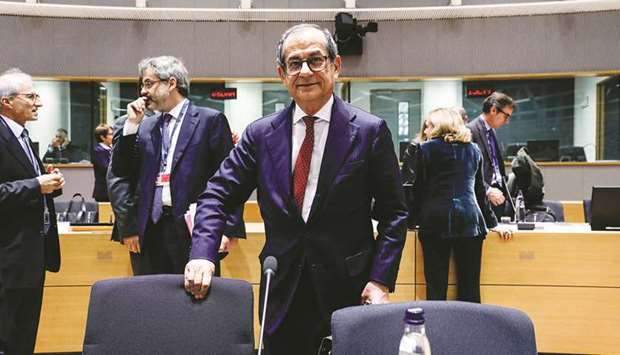Italy’s finance minister is working on limited adjustments to the populist government’s 2019 budget, according to a media report, as European Commission Vice President Valdis Dombrovskis delivered a warning ahead of a Tuesday deadline to revise the spending plan.
Finance Minister Giovanni Tria, who has fought a losing battle to contain a spending push by deputy premiers Luigi Di Maio of the anti-establishment Five Star Movement and Matteo Salvini of the anti-migration League, will confirm a deficit of 2.4% of national growth despite pressure from the commission, newspaper Il Sole 24 Ore reported on Saturday.
With Italy’s reply due next week, Tria and his staff are assessing economic growth targets, emergency spending needs after devastating storms, the weight of interest payments on debt and measures to guarantee that there will be no breach of the 2.4% target, the newspaper said. Italy could predict growth below a current target of 1.5% for next year, after the commission set its own forecast on Thursday at 1.2%, Sole added.
In an unprecedented rebuke, the European Union executive body has demanded a revised budget as the government in Rome seeks to meet election promises, including a citizen’s income for the poor, lower taxes and a cut in the retirement age. The commission effectively rejected the proposed budget, saying it constitutes a clear deviation from EU fiscal rules.
The target deficit of 2.4% of gross domestic product would remain unchanged, Repubblica said, adding that Tria discussed the budget with Bank of Italy Governor Ignazio Visco on Saturday.
The European Commission says a 2.4% deficit is too expansive, while predicting the actual gap will be an even wider 2.9%, grazing the European Union’s 3% limit. In an unprecedented rebuke, the commission demanded the populist government submit a revised budget by tomorrow.
Tria is under pressure from deputy premiers Luigi Di Maio and Matteo Salvini, who insist on fulfilling at least part of their election campaign promises to deliver a citizen’s basic income for the poor, tax cuts and a lower retirement age.
Tria and Visco publicly sparred over the spending boost on October 31, with the governor cautioning that the growth divide between Italy and the rest of the euro area “is a structural problem that can’t be solved by monetary stabilisation policies or by expanding the government’s budget.” Tria retorted that the spending plans aim to reduce that gap.
Tria has said that meeting the commission’s demands would be “suicide” and has called its economic forecasts “a technical fault.”
Dombrovskis said “slogans cannot negate economic reality.”
“From previous experiences, we’ve seen that damages to the economy can be done quickly,” Dombrovskis said in an interview with La Stampa. “But then it takes years to repair them.”
He said the commission is considering a possible excessive deficit procedure for Italy — in which the country would have to reduce its deficit by a set deadline or risk sanctions of up to 0.2% of economic output. The government’s strategies “are slowing down the Italian economy further,” Dombrovskis said.
In response to Tria’s statement that meeting the commission’s demands would be “suicide” and calling its economic forecasts “a technical fault,” Dombrovskis retorted: “Slogans cannot cancel economic reality.”
Tria is even under pressure from within his ministry, with deputy Massimo Garavaglia of the League urging an acceleration of reforms given growth prospects, rather than slowing down the actions.
“There’s probably the need to apply them even faster,” Garavaglia told newspaper Corriere della Sera.
“We’re seeing the economy slowing, so all the more reason” for an expansive budget, he said.

Giovanni Tria, Italy’s finance minister, arrives for a round-table discussion during a Eurogroup meeting in Brussels, Belgium, on November 5. Tria, who has fought a losing battle to contain a spending push by deputy premiers Luigi Di Maio of the anti-establishment Five Star Movement and Matteo Salvini of the anti-migration League, will confirm a deficit of 2.4% of national growth despite pressure from the European Commission, newspaper Il Sole 24 Ore reported on Saturday.
